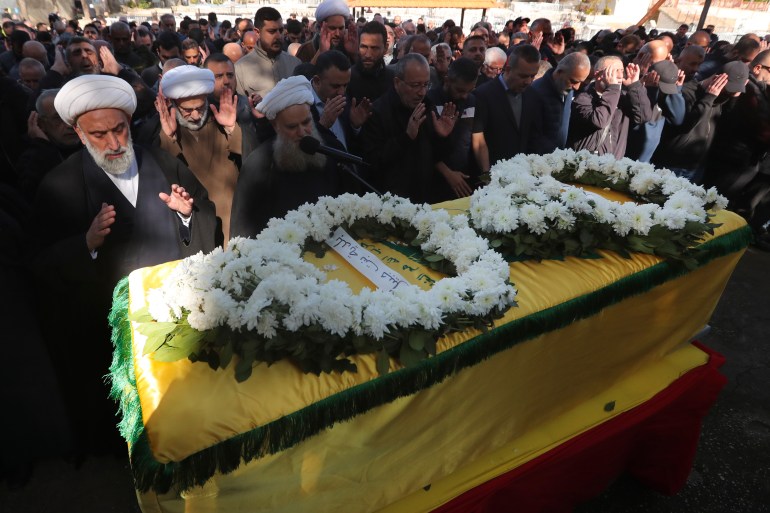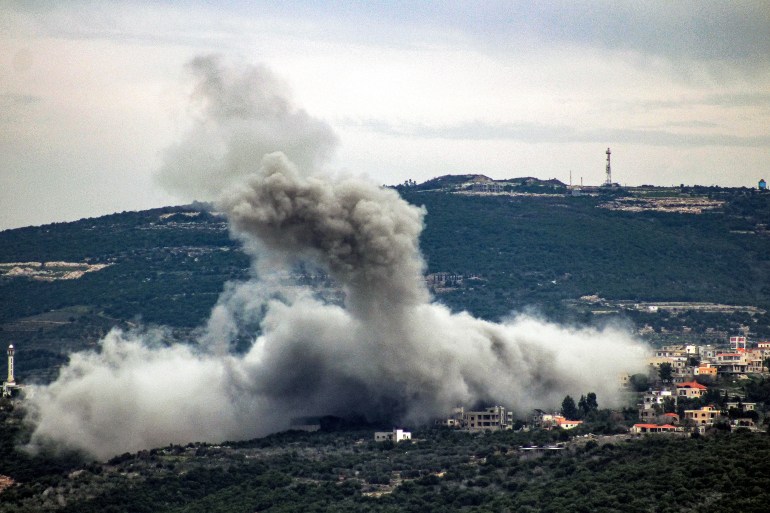Beirut, Lebanon – Israel’s attacks on southern Lebanon have intensified in recent days, reaching a new peak on Wednesday, a day that saw both sides inflict casualties.
On Wednesday morning, an Israeli soldier was killed and eight wounded in a Hezbollah rocket attack on a base in Safad.
Israel responded with a round of attacks on villages across southern Lebanon, including Iqlim al-Tuffah, Aadchit, Jibchit and Labbouneh.
At least four deaths, including a mother and her two children, and multiple injuries were reported as photos and videos of smoke billowing from destroyed buildings emerged on Hezbollah-linked Telegram groups. A Hezbollah fighter was also reportedly killed.
The attacks are not new, but the intensification follows attempts by international diplomats to bring an end to the conflict across the Lebanese-Israeli border.
For the past three nights, “the raids have lasted till 3am,” Ramiz Dallah told Al Jazeera by phone on Tuesday as the line was repeatedly cut. “It wasn’t this bad before. This time, we’re not hearing drones but warplanes.”
Although the bombing has driven most people in his hometown away, Dallah, who works as a freelance journalist, returns every evening to stay with his mother, who refuses to leave.
Israel has attacked much of the 120km (75-mile) border, also known as the Blue Line, by air and artillery since October 8 when Hezbollah launched attacks on Israel in solidarity with Hamas. More than 240 people have been killed, including at least 22 civilians.

As Israel’s attacks intensify, they have become less precise, causing more deaths and more significant damage.
Israel “targets civilians, media and villages in addition to targeting [Hezbollah] party fighters”, Qassem Kassir, a Lebanese commentator close to Hezbollah, told Al Jazeera.
“It wants to empty the area south of the Litani [River] of civilians.”
‘War crimes’ against south Lebanon’s population
Analysts agreed, telling Al Jazeera that Israel’s history of behaviour in conflict shows efforts to make southern Lebanon uninhabitable for civilians to create a security buffer zone.
Human rights organisations said these attacks on civilians amount to war crimes.
“Over the past week, civilians in Lebanon have been reportedly killed in at least four separate Israeli strikes in south Lebanon,” Ramzi Kaiss, a researcher at Human Rights Watch’s (HRW’s) Beirut office, said.
“This follows reports by several human rights organisations… that Israel has conducted unlawful strikes in Lebanon, including through both apparently indiscriminate and deliberate attacks on civilians, amounting to war crimes.”
On Saturday, an Israeli artillery attack on Houla, a Lebanese village on the border, killed a Lebanese security officer and a civilian bakery worker and injured others, including children, after shells landed near a mosque.
A source who monitors security incidents for a major humanitarian organisation said the attack was followed by drone fire to harass or kill first responders.
More than 87,000 people have been displaced from southern Lebanon since October 8, according to the International Organization for Migration. Those who have stayed are the elderly or those too impoverished to afford rent elsewhere. Those who could are staying in Lebanon’s 18 shelters for displaced people while others are staying with friends or family.
“Some days the bombing is too strong, so I can’t go home,” a 53-year-old man from the southern town of Khiam who asked to remain anonymous for his safety, told Al Jazeera, describing the incessant sound of warplanes and Israeli spy drones.
How to make a buffer zone
Israel’s strategy of total warfare on southern Lebanon is having an effect.
“It’s very striking when you drive to the south,” said Nadim Houry, the former head of HRW’s Beirut office and current executive director of the Arab Reform Initiative in Paris.
“The Lebanese side is completely barren land whereas the Israelis are cultivating down to the last inch before the border. The [Israelis] made it quasi-impossible to plant [crops].”
Israel invaded Lebanon and laid siege to west Beirut in 1982, then occupied the country from 1985 to 2000. In 2006, Hezbollah and Israel faced off in a month-long conflict.

The damage to Lebanon’s infrastructure in 2006 was more than $3.5bn as Israel employed the Dahiya Doctrine, which aims to pressure their opponents by levelling civilian infrastructure.
During the 2006 war, Israel “carried out widespread bombardment of southern Lebanon … in a manner that did not discriminate between military objectives and civilians”, according to an HRW report from September 2007 titled, Why They Died: Civilian Casualties in Lebanon during the 2006 War.
“[Israeli army] cluster munitions struck wide swathes of southern Lebanon, particularly during the last three days of the conflict when both sides knew a settlement was imminent,” the report said.
Houry, who was the author of that report, said certain patterns emerged during the 2006 conflict that inform how Israel approaches southern Lebanon today.
“At that point, everyone knew the war was over. Why would you drop that many submunitions?” Houry asked.
“They basically emptied out all the reserves of submunitions, including some going back to the ’70s, and littered southern Lebanon to prevent a return of normal life to the south.”
Houry said the Israelis also would bomb buildings they knew were empty just because Hezbollah members lived there.
“The Israelis very much know that this fighter is no longer living there when the fight starts, but they use it as an excuse to bomb the entire building,” Houry said.
Why hit houses with nobody inside?
Some of the damage in southern Lebanon, like the devastated economy, will have longer-term effects.

“Economically, nothing’s here, even in areas where there’s no bombing,” Dallah said. “If there are explosions … all day, there is nothing left called ‘the economy’.”
He said many families left to shield their children from the physical and mental trauma of the explosions. Some of the people remaining in local communities worry that some who left may never return to the south.
Israel has used white phosphorus munitions on southern Lebanon, a violation of international humanitarian law, according to Amnesty International, because they can cause “respiratory damage, organ failure and other horrific and life-changing injuries, including burns that are extremely difficult to treat and cannot be put out with water”.
The phosphorus also damages crops and destroys trees. The south is rich in olives, and Lebanon’s two southernmost governorates supply more than a third of the country’s olive oil.
But the current olive season has been ravaged by the war with some farmers harvesting at night to avoid the bombing while others have quit entirely. Many are considering emigration.
“They want this buffer zone, … not just for the fighters, but also to push the actual people back and make it uninhabitable and impossible to cultivate,” Houry said.
As the attacks increase, the civilians of southern Lebanon are left wondering if their house or their family could be next.
The 53-year-old man from Khiam, who works as a driver but needs extra support from his children to make ends meet, said the Israelis bombed his neighbourhood recently.
“It’s a civilian area,” he said. “Everyone left apart from some older people or people who don’t have money to rent elsewhere. They’re destroying civilian buildings.
“They don’t distinguish between targets.”








